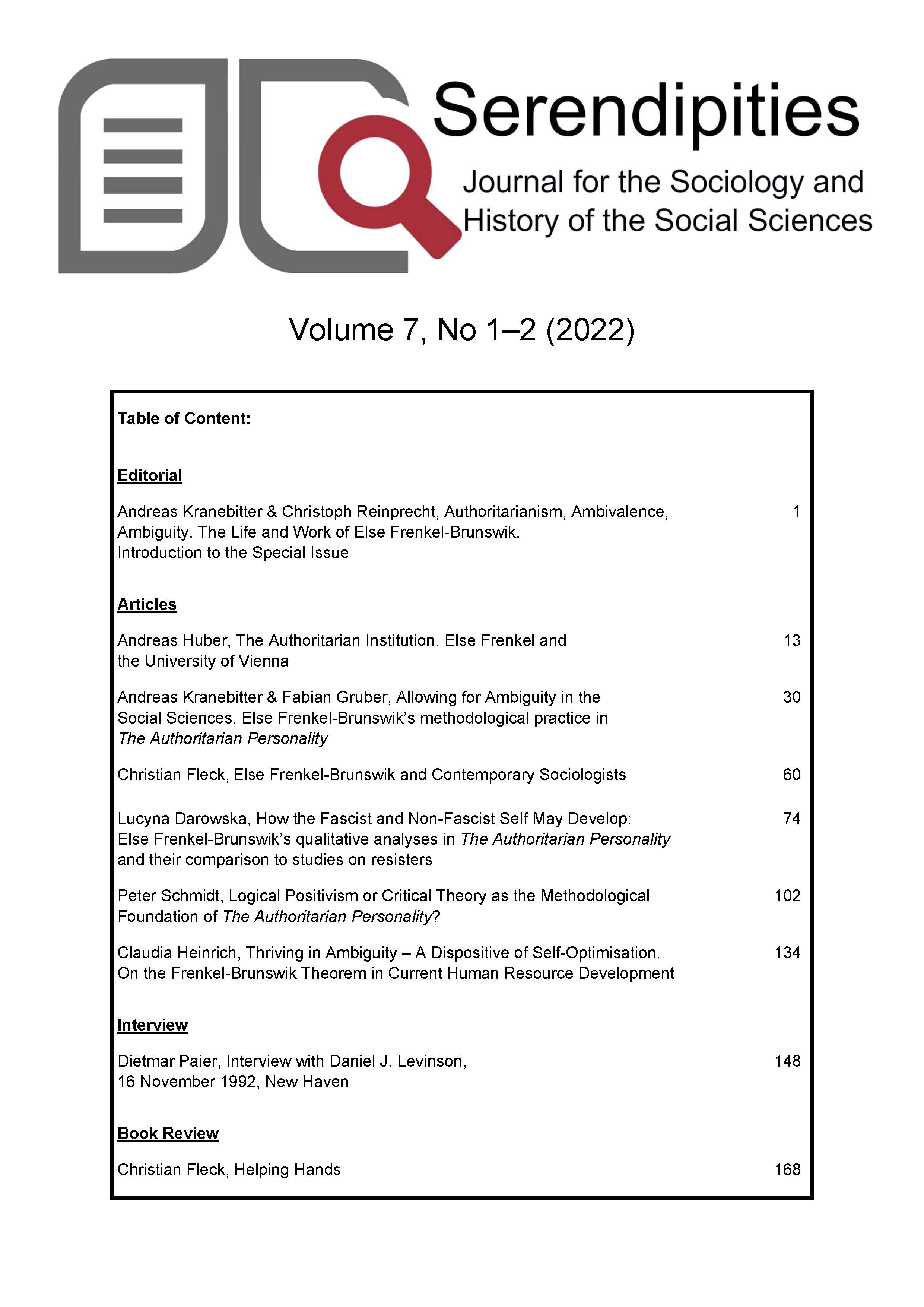Authoritarianism, Ambivalence, Ambiguity
The Life and Work of Else Frenkel-Brunswik. Introduction to the Special Issue
DOI:
https://doi.org/10.7146/serendipities.v7i1-2.135380Keywords:
Else Frenkel-Brunswik, authoritarianism, exile, social psychology, sociology, history of the social sciences, critical theory, fascismReferences
Adorno, Theodor W., Else Frenkel-Brunswik, Daniel J. Levinson and R. Nevitt Sanford (1950) The Authoritarian Personality. New York: Harper and Brothers.
Benetka, Gerhard (2002) Frenkel-Brunswik, geb. Frenkel, in: Keintzel, Brigitte, and Ilse Korotin (eds.) Wissenschaftlerinnen in und aus Österreich. Leben, Werk, Wirken. Wien: Böhlau, 190–193.
Blum, Ben (2018) The Lifespan of a Lie. The most famous psychology study of all time was a sham. Why can’t we escape the Stanford Prison Experiment?, https://gen.medium.com/the-lifespan-of-a-lie-d869212b1f62 (accessed August 22, 2022).
Bourdieu, Pierre (1986) L’illusion biographique. Actes de la Recherche ern Sciences Sociales 62–63: 69–72. https://doi.org/10.3406/arss.1986.2317.
Bourdieu, Pierre (2017) The biographic Illusion, in: Saunders, Edward, and Wilhelm Hemecker (Eds.), Biography in Theory. Key Texts with Commentaries, 210–216. Berlin: de Gruyter. https://doi.org/10.1515/9783110516678-036.
Christie, Richard, and Marie Jahoda (1954) Studies in the Scope and Method of “The Authoritarian Personality”. Continuities in Social Research, Glencoe: The Free Press.
Fleck, Christian (2011) A Transatlantic History of the Social Sciences. Robber Barons, the Third Reich and the Invention of Empirical Social Research. London; New York: Bloomsbury Aca-demic. https://doi.org/10.5040/9781849662932.
Gordon, Peter E. (2018) The authoritarian personality revisited: Reading Adorno in the age of Trump. In: Brown, Wendy, Peter E. Gordon and Max Pensky (eds.) Authoritarianism. Three Inquiries in Critical Theory, 45–84. Chicago: University of Chicago Press.
Heiman, Nanette, and Joan Grant (1974) Introduction, in: Frenkel-Brunswik, Else: Selected Papers. Edited by Nanette Heiman and Joan Grant, Psychological Issues 8(3), Monograph 3. New York: International University Press, 3–35.
Hyman, Herbert H., and Paoul B. Sheatsley (1954) “The Authoritarian Personality” – a Methodolog-ical Critique, in: Christie, Richard, and Marie Jahoda (eds.) Studies in the Scope and Method of “The Authoritarian Personality”. Continuities in Social Research, 50–122. Glencoe: The Free Press.
Kranebitter, Andreas, and Christoph Reinprecht (eds.) (2019) Die Soziologie und der Nationalsozi-alismus in Österreich. Bielefeld: transcript. https://doi.org/10.1515/9783839447338.
Kranebitter, Andreas (2020) Rebels without a cause? ‘Criminals’ and fascism in The Authoritarian Personality, Journal of Classical Sociology 22(3): 257–281. https://doi.org/10.1177/
X20978506.
Kranebitter, Andreas (2022) Tiefe Oberflächenpsychologie statt oberflächlicher Tiefenpsychologie. Zu Leben und Werk von Else Frenkel-Brunswik, in: Decker, Oliver, Fiona Kalkstein and Johannes Kiess (eds.): Demokratie in Sachsen. Jahrbuch des Else-Frenkel-Brunswik-Instituts für 2021, 23–33. Leipzig. Edition Überland.
Le Texier, Thibault (2018) Histoire d’un mensonge: Enquête sur l’expérience de Stanford [History of a Lie: An Inquiry into the Stanford Prison Experiment]. Paris: La Découverte.
Le Texier, Thibault (2019) Debunking the Stanford Prison Experiment, American Psychologist 74(7), 823–839. http://dx.doi.org/10.1037/amp0000401.
Meloen, Jos D. (1991) The Fortieth Anniversary of “The Authoritarian Personality”, Politics and the Individual 1(1): 119–127.
Paier, Dietmar (1996) Einleitung, in: Frenkel-Brunswik, Else: Studien zur autoritären Persönlich-keit. Edited by Dietmar Paier (=Bibliothek sozialwissenschaftlicher Emigranten, Band 3), 7–70. Graz; Wien: Nausner & Nausner.
Perry, Gina (2012) Behind the shock machine: The untold story of the notorious Milgram psychol-ogy experiments. Brunswick: Scribe.
Reicher, Stephen D., S. Alexander Haslam, and Joanne R. Smith (2012) Working Toward the Experimenter: Reconceptualizing Obedience Within the Milgram Paradigm as Identification-Based Followership, Perspectives on Psychological Science 7(4): 315–324. https://doi.org/
1177/1745691612448482.
Reinprecht, Christoph, and Nora Walch (2020) Wiener Verortungen: Eine Analyse der urbanen Ver-ankerung soziologischen Denkens und Forschens. In: Grenz, Tilo, Pfadenhauer, Michaela, and Christopher Schlembach (Eds.) Kommunikative Wissenskulturen. Theoretische und empirische Erkundungen in Gegenwart und Geschichte, 24–46. Weinheim: Beltz Juventa.
Roiser, Martin, and Carla Willig (2002) The strange death of the authoritarian personality: 50 years of psychological and political debate, History of the Human Sciences 15(4): 71–96. https://doi.org/10.1177/0952695102015004682.
Shils, Edward A. (1954) Authoritarianism: “Right” and “Left”, in: Christie, Richard, and Marie Jahoda (1954) Studies in the Scope and Method of “The Authoritarian Personality”. Continuities in Social Research, 24–49. Glencoe: The Free Press.
Smeulers, Alette (2020) Milgram Revisited: Can we still use Milgram’s ‘Obedience to Authority’ Ex-periments to Explain Mass Atrocities after the Opening of the Archives? Review Essay, Journal of Perpetrator Research 3(1): 216–244. http://doi.org/10.21039/jpr.3.1.45.
Stone, William F., Gerda Lederer, and Richard Christie (eds.) (1993) Strength and Weakness. The Authoritarian Personality Today, New York et al.: Springer.
Downloads
Published
How to Cite
Issue
Section
License
Copyright (c) 2022 Andreas Kranebitter; Christoph Reinprecht

This work is licensed under a Creative Commons Attribution-NonCommercial-NoDerivatives 4.0 International License.
CC-BY-NC-ND





